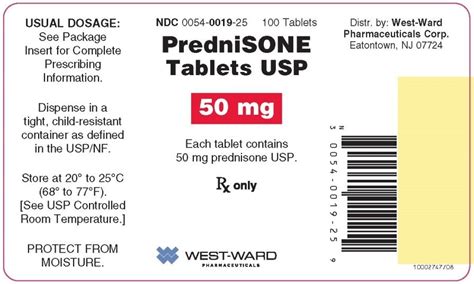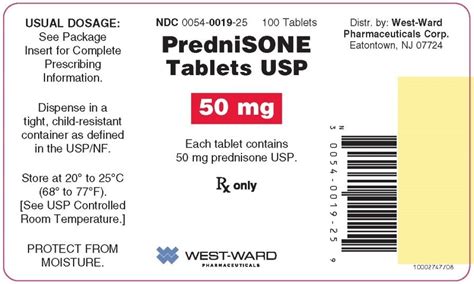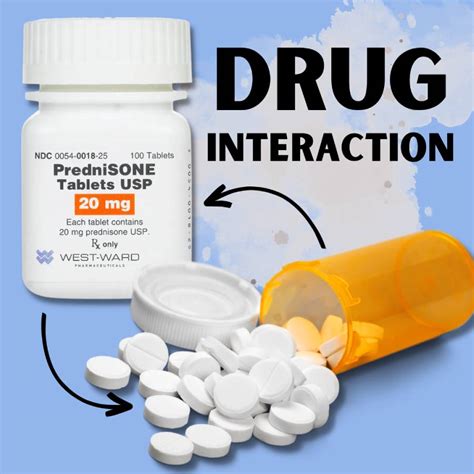Intro
Discover the versatile uses of Prednisone, a potent steroid, for treating inflammation, autoimmune diseases, asthma, and more, exploring its benefits and applications in medicine, including anti-inflammatory effects and immune system regulation.
Prednisone is a synthetic corticosteroid that has been widely used in the medical field for its potent anti-inflammatory and immunosuppressive properties. It is a synthetic version of the naturally occurring steroid hormone cortisol, which is produced by the adrenal gland. Prednisone has been used to treat a variety of conditions, ranging from allergic reactions to autoimmune diseases. In this article, we will explore the different uses of prednisone, its benefits, and its potential side effects.
Prednisone has been a cornerstone in the treatment of various medical conditions, and its effectiveness has been well-documented. It is often prescribed to patients who suffer from chronic illnesses, such as asthma, rheumatoid arthritis, and lupus. The medication works by suppressing the immune system, reducing inflammation, and preventing the release of chemicals that cause allergic reactions. This makes it an ideal treatment option for patients who experience severe symptoms and need quick relief.
The importance of prednisone cannot be overstated, as it has improved the quality of life for millions of people worldwide. Its ability to reduce inflammation and suppress the immune system has made it a vital component in the treatment of various medical conditions. Moreover, prednisone is often used in combination with other medications to enhance its effectiveness and minimize its side effects. As we delve deeper into the uses of prednisone, it becomes clear that this medication is a versatile and powerful tool in the medical field.
What is Prednisone Used For?

Prednisone is used to treat a wide range of medical conditions, including allergic reactions, autoimmune diseases, and respiratory disorders. It is often prescribed to patients who suffer from severe asthma, as it helps to reduce inflammation and prevent allergic reactions. Additionally, prednisone is used to treat rheumatoid arthritis, lupus, and other autoimmune diseases that cause inflammation and damage to the joints and organs.
Benefits of Prednisone
The benefits of prednisone are numerous, and it has been shown to be effective in reducing inflammation, suppressing the immune system, and preventing allergic reactions. Some of the benefits of prednisone include: * Reduced inflammation and swelling * Suppressed immune system activity * Prevention of allergic reactions * Improved symptoms of respiratory disorders, such as asthma * Reduced joint pain and inflammation in patients with rheumatoid arthritis5 Uses For Prednisone

Here are five uses for prednisone:
- Asthma treatment: Prednisone is often used to treat severe asthma attacks, as it helps to reduce inflammation and prevent allergic reactions.
- Rheumatoid arthritis treatment: Prednisone is used to treat rheumatoid arthritis, as it helps to reduce joint pain and inflammation.
- Lupus treatment: Prednisone is used to treat lupus, as it helps to suppress the immune system and reduce inflammation.
- Allergic reaction treatment: Prednisone is used to treat severe allergic reactions, such as anaphylaxis, as it helps to reduce inflammation and prevent allergic reactions.
- Cancer treatment: Prednisone is sometimes used in combination with other medications to treat certain types of cancer, such as leukemia and lymphoma.
How Does Prednisone Work?
Prednisone works by suppressing the immune system and reducing inflammation. It does this by binding to specific receptors in the body, which helps to reduce the production of inflammatory chemicals. Additionally, prednisone helps to prevent the release of chemicals that cause allergic reactions, which makes it an effective treatment option for patients who suffer from severe allergies.Prednisone Side Effects

While prednisone is an effective treatment option for various medical conditions, it can also cause side effects. Some common side effects of prednisone include:
- Weight gain
- Mood changes
- Insomnia
- Increased appetite
- Water retention
- Thinning skin
- Osteoporosis
Prednisone Dosage
The dosage of prednisone varies depending on the medical condition being treated. Typically, patients are prescribed a high dose of prednisone, which is then tapered down to a lower dose over time. It is essential to follow the dosage instructions carefully, as taking too much prednisone can lead to serious side effects.Prednisone Interactions

Prednisone can interact with other medications, which can increase the risk of side effects. Some medications that interact with prednisone include:
- Blood thinners
- Diabetes medications
- Blood pressure medications
- Antidepressants
- Anti-anxiety medications
Prednisone and Pregnancy
Prednisone can be used during pregnancy, but it is essential to use it under the guidance of a healthcare provider. Prednisone can pass into breast milk, so breastfeeding mothers should use it with caution.Prednisone and Children

Prednisone can be used in children, but it is essential to use it under the guidance of a healthcare provider. Children who take prednisone may experience side effects, such as growth suppression and mood changes.
Prednisone and the Elderly
Prednisone can be used in the elderly, but it is essential to use it with caution. Older adults may experience side effects, such as osteoporosis and thinning skin, which can increase the risk of falls and fractures.Prednisone Alternatives

There are several alternatives to prednisone, including:
- Hydrocortisone
- Dexamethasone
- Methylprednisolone
- Prednisolone
Prednisone and Lifestyle Changes
Making lifestyle changes can help reduce the need for prednisone. Some lifestyle changes that can help include: * Quitting smoking * Exercising regularly * Eating a healthy diet * Managing stress * Getting enough sleepPrednisone and Future Research

Future research on prednisone is focused on developing new uses for the medication and reducing its side effects. Some areas of research include:
- Developing new formulations of prednisone that reduce side effects
- Investigating the use of prednisone in new medical conditions
- Studying the long-term effects of prednisone use
Prednisone and Patient Education
Patient education is essential for patients who take prednisone. Patients should be aware of the potential side effects, interactions, and lifestyle changes that can help reduce the need for prednisone.What is prednisone used for?
+Prednisone is used to treat a wide range of medical conditions, including allergic reactions, autoimmune diseases, and respiratory disorders.
What are the benefits of prednisone?
+The benefits of prednisone include reduced inflammation, suppressed immune system activity, and prevention of allergic reactions.
What are the side effects of prednisone?
+Common side effects of prednisone include weight gain, mood changes, insomnia, increased appetite, and water retention.
Can prednisone be used during pregnancy?
+Prednisone can be used during pregnancy, but it is essential to use it under the guidance of a healthcare provider.
Are there any alternatives to prednisone?
+Yes, there are several alternatives to prednisone, including hydrocortisone, dexamethasone, methylprednisolone, and prednisolone.
In conclusion, prednisone is a versatile and powerful medication that has been used to treat a wide range of medical conditions. Its ability to reduce inflammation and suppress the immune system has made it a vital component in the treatment of various diseases. While prednisone can cause side effects, it is essential to weigh the benefits and risks of using this medication. By understanding the uses, benefits, and side effects of prednisone, patients can make informed decisions about their treatment options. We encourage readers to share their experiences with prednisone and to ask questions about this medication. Additionally, we invite readers to explore other resources and articles on our website to learn more about prednisone and other medical topics.
